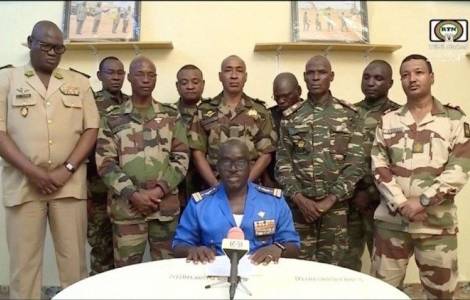
Niamey (Fides News Agency) - "The Niamey putschists draw inspiration from the examples of Bamako and Ouagadougou, whose juntas survived the sanctions, and who opposed the "international community" and the ECOWAS (Economic Community of West African States), although they hardly endeavored for a return to a democratic government" says Rahmane Idrissa, a Nigerien researcher with the University of Leiden.
"Like in these other countries, the Nigerien junta is currently benefitting from the adulation of the public. They might interpret this as a form of legitimization that exempts them from having to revert to a democratic process", the researcher explains. "In the meantime, the ideological climate pushing for a break with France and the West, will also help to pave the way for authoritarianism, even if the West could be criticized for turning a blind eye to the authoritarian tendencies of the PNDS (the party of the deposed president, Mohammed Bazoum)”.
Referring to the putschist juntas in Mali and Burkina Faso, Rahmane Idrissa claims that "the events in Mali and Burkina Faso show that, after a year or so, genuine support for juntas is limited to the committed ideologs and to those who've staked their future on these regimes. Others tend to accept them, as the changes to their lives are minimal. The result is a political regression of sorts, even if the democracy practiced under Ibrahim Boubakar Keita in Mali, or Niger's Gouri system (a system of cooptation of the opposition which effectively voided the democratic system of its meaning, Ed.) have rarely made any progress".
"In all three countries, therefore, a restoration of democracy can only come from outside pressure, that of the ECOWAS in particular", the scholar continues. "However, in Niger, said pressure got off to a bad start. That's because Nigeria was blindsided by the putsch, exasperated by the feeling of one too many coups, and under a leader - Bola Tinubu - who is determined to give the ECOWAS an authentic Nigerian imprint (even though Nigerians know and understand very little of their French-speaking neighbors), its response was harsh. It included threats of armed intervention alongside sanctions like shutting off Niger's electricity, over 70% of which comes from Nigeria. The Niamey putschists - who naively did not expect this backlash - responded with indignation, calling back ambassadors, breaking agreements and refusing to receive emissaries".
The prospected scenario, according to Idrissa, is a grim one: If the putschists manage to consolidate their dominance and maintain their intransigency, refusing to come to any agreement whatsoever with Nigerians and with the West, the likely outcome will be the withdrawal of European troops and of development assistance (or humanitarian funding, even) and the continuation of ECOWAS sanctions, which will probably harm Niger more than Mali, increasing the suffering of the Nigerien people" says Idrissa, who concludes by outlining two unknown factors: "the attitude of the Americans, who will want to keep their bases in the desert, and that of the Russians, should the junta decide to invite them to Niger in the guise of the Wagner group". (L.M.) (Fides News Agency 9/8/2023)